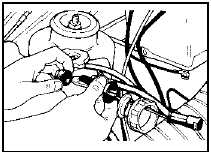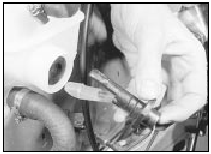Expansion tank and coolant level sensor - removal and refitting
Removal
1 With the engine cold, slowly unscrew the
expansion tank cap to release any remaining
pressure from the cooling system. Remove
the cap.
2 Place a suitable container beneath the expansion tank.
3 Disconnect and plug the upper hose.
4 Where applicable, disconnect the coolant level sensor wiring plug.
5 Unscrew the expansion tank securing screws, and tilt the tank so that the coolant runs to the sealed end.
6 Disconnect and plug the lower hose.
7 Drain the expansion tank into the container and remove the tank.
8 Where applicable, the coolant level sensor can be removed from the tank by unscrewing the collar from the sensor, then withdrawing the spacer, sensor and seal (see illustration).

15.8a Removing the coolant level sensor from the expansion tank
Renew the seal if necessary. Note that the sensor can only be fitted in one position (see illustration).

15.8b Fitting the coolant level sensor
Refitting
9 Refitting is a reversal of removal.
10 On completion, top-up the coolant level to the maximum mark, then refit the expansion tank cap and run the engine at a fast idling speed for several minutes. Check the expansion tank for leaks, then stop the engine and if necessary top-up the coolant level.
See also:
Pistons and connecting rods - removal and refitting
1.8 litre (R2A type)
Removal
1 With the engine removed from the vehicle,
remove the sump and the cylinder head.
2 Check the big-end caps for identification
marks and if necessary use a centre-pun ...
Ford Escort maintenance schedule
The maintenance intervals in this manual are provided with the
assumption that you, not the dealer, will be carrying out the work. These
are the minimum maintenance intervals recommended by the
man ...
General information and precautions
The body electrical system consists of all
lights, wash/wipe equipment, interior
electrical equipment, and associated switches
and wiring.
The electrical system is of the 12 volt
negative earth t ...
